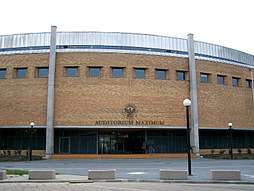Cardinal Stefan Wyszyński University in Warsaw
Cardinal Stefan Wyszyński University in Warsaw (Polish: Uniwersytet Kardynała Stefana Wyszyńskiego w Warszawie) is a state university in Warsaw. It was founded in 1999, and it is named after Cardinal Stefan Wyszyński of Poland.[3] It offers religious studies at the faculties of theology, Canon law and Christian philosophy under the patronage of Archbishop of Warsaw issuing permits (missio canonica) to academic staff at those faculties. The secular studies with particular sensitivity to Christian values fall under the Ministry of Education.[4]
Uniwersytet Kardynała Stefana Wyszyńskiego w Warszawie | |
 | |
| Latin: Universitas Cardinalis Stephani Wyszyński Varsoviae | |
| Motto | "Soli Deo" |
|---|---|
| Type | University |
| Established | 3 September 1999 |
| Rector | Stanisław Dziekoński |
Academic staff | 785[1] |
Administrative staff | 1.100[1] |
| Students | 19 000[2] |
| Address | ul. Dewajtis 5 , , 01-815 Warszawa 52°17′42″N 20°57′35″E |
| Affiliations | Socrates-Erasmus |
| Website | www |
History
The university traces its history to Warsaw Theological Academy (Akademia Teologii Katolickiej), created by the Polish communist government after it had closed down the theology departments at University of Warsaw and Jagiellonian University. The academy did not receive full acceptance from Roman Catholic Church in Poland until the fall of communist authorities in 1989 removed state control over the institution. In 1999 the academy was transformed into the current university.
The university consists of two main campuses in Warsaw's northern districts. The old one at Bielany and the new one at Mlociny, which mostly houses arts and humanities faculties.
Faculties

- Faculty of Theology
- Institute of Theology: theology, missiology, religious studies
- Institute of Medial Education and Journalism: medial education and journalism, journalism and social communication
- Theological Institute of Radom: theology
- Faculty of Canon Law
- Faculty of Family Studies
- Institute of Family Studies: family studies
- Faculty of Christian Philosophy
- Institute of Philosophy: philosophy
- Institute of Psychology: psychology
- Institute of Ecology and Bioethics: ecology
- Faculty of History and Social Sciences
- Institute of History: history, history of early Christian literature, musicology
- Institute of Archeology: archeology
- Institute of Political Science: political science, european studies
- Institute of Sociology: sociology, economics, social work
- Institute of History of Art: history of art
- Faculty of Law and Administration
- Law, administration, international relations
- Faculty of Humanistic Sciences
- Institute of Polish Philology: Polish philology, cultural studies, classical philology
- Faculty of Mathematics and Natural Sciences
- Mathematics, computer science and econometry, physics, chemistry, macrofaculty (mathematics, chemistry, physics), computer science
- Faculty of Biology and Environmental Sciences
- Faculty of Pedagogy
References
- UKSW dziś Archived July 16, 2011, at the Wayback Machine
- O Uniwersytecie
- Cardinal Stefan Wyszyński University history, homepage. Archived 2012-05-02 at the Wayback Machine (in Polish)
- Rzecznik Uniwersytetu (2003-10-08). "Powstanie Uniwersytetu Kardynała Stefana Wyszyńskiego i jego szczególny charakter". Historia UKSW (in Polish). Biuletyn Informacji Publicznej. Retrieved September 24, 2012.